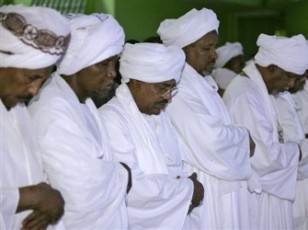Sudan-Egypt relations hit speed bump over Four Freedoms accord
February 24, 2013 (KHARTOUM) – The Sudanese government on Sunday expressed unhappiness with the reluctance of Egypt to implement the Four Freedoms agreement signed in 2004 despite a revolution that brought a new government to power.

Furthermore, Egypt wants its citizens to have freehold ownership rights which Awad says contradicts the lease law in Sudan.
The official said the matter would be escalated to 1st Vice president Ali Osman Taha for a decision.
The Four Freedom Agreement guarantees to citizens from the two countries freedom of movement and residence, right to work and own property. It was signed in Cairo by former president Hosni Mubarak and Sudanese president Omer Hassan al-Bashir on 18 January 2004.
Egypt under Mubarak feared a massive influx by refugees or even terrorists from Sudan if the accord was implemented.
Awad also disclosed that Cairo has yet to return 100 vehicles belonging to Sudanese gold miners who entered into Egypt by mistake.
The miners were released only after several appeals from Khartoum but the equipment and vehicles remained on the Egyptian side.
On the decades-long border dispute over the Halayeb triangle on the Egypt-Sudan border, Awad said that Sudan insists on its sovereignty over the area but added that the time is not ripe for discussing the matter because of the current political instability in Egypt.
He revealed that the opening of the border crossings has been delayed again at the request of Egypt which was originally scheduled for early March.
The two countries agreed to overcome a disagreement in the crossings agreement by replacing the “international borders” clause with the “latitude line 22 ” as Sudan saw it as inferring Egypt’s ownership of the Halayeb triangle.
The genesis of the disputes over Halayeb dates back to as early as 1958 after Sudan gained independence from being ruled jointly by Britain and Egypt. The wrangle is a result of a discrepancy in the demarcation of political boundaries set by the Anglo-Egyptian Condominium and the ones set earlier by the British in 1902.
Cairo rejects any international arbitration over the area. This week Sudan’s foreign ministry said that the country’s complaint to the UNSC on Halayeb has been pending since 1958 and is renewed annually for consideration.
Sudanese officials including Bashir welcomed the overthrow of Mubarak in February 2011 and accused the latter of conspiring against Khartoum in the past.
Sudan’s Islamist government is hoping that it will have much in common with Egyptian president Muhammad Morsi who belongs to the Muslim Brotherhood’s Freedom and Justice Party (FJP).
(ST)
